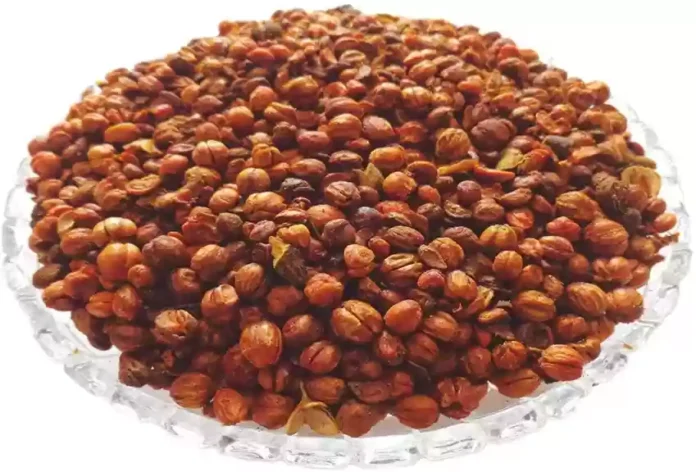Introduction

The Celastrus Paniculatus, commonly known as the Dry Malkangani tree or the “Intellect Tree,” is a woody climber indigenous to India and Southeast Asia. It has been used in traditional medicine for centuries due to its remarkable health benefits. The plant’s seeds, in particular, are highly valued for their medicinal properties. In this article, we’ll explore the different forms of Celastrus Paniculatus, its various benefits, and the potential side effects.
Forms of Dry Malkangani Tree (Celastrus Paniculatus)
The Dry Malkangani tree is primarily known for its seeds, which are rich in bioactive compounds. These seeds can be processed in several forms, which include:
- Oil Extract: The seeds of Celastrus Paniculatus are cold-pressed to produce an oil. This oil is highly regarded for its therapeutic applications, especially in Ayurvedic medicine.
- Powder: The seeds are dried and ground into powder, which can be consumed in various ways or used as a part of medicinal formulations.
- Capsules: In modern times, Celastrus Paniculatus extract is available in capsule form, making it easier for individuals to include it in their daily health regimen.
- Tincture: A tincture is made by soaking the seeds in alcohol or another solvent to extract the medicinal compounds. This form is often used for its potency and quick absorption.
- Tea: The leaves of the tree may also be used to make herbal teas, although they are less commonly used than the seeds.
- Powdered Seed Oil: In some traditional practices, the seeds are powdered into a fine powder and mixed with other herbal ingredients to create a paste or oil for topical use.
Benefits of Dry Malkangani (Celastrus Paniculatus)
The Dry Malkangani tree is lauded for its wide range of health benefits, particularly in enhancing brain function, managing neurological conditions, and promoting overall well-being. Some of its key benefits include:

- Cognitive Enhancement: One of the most famous benefits of Celastrus Paniculatus is its ability to boost cognitive function. It is considered a potent brain tonic in traditional medicine, promoting memory, concentration, and mental clarity. It has been used to improve mental alertness and to treat conditions such as memory loss and cognitive decline.
- Neuroprotective Properties: Studies suggest that the active compounds in Celastrus Paniculatus help protect the brain from oxidative stress and damage, making it beneficial for conditions like Alzheimer’s disease, Parkinson’s disease, and other neurodegenerative disorders.
- Anti-inflammatory Effects: The oil extracted from Celastrus Paniculatus is known for its anti-inflammatory properties, which can be beneficial for reducing inflammation in the body, such as in conditions like arthritis.
- Stress and Anxiety Relief: Celastrus Paniculatus has adaptogenic properties, helping to regulate the body’s response to stress. It can reduce anxiety, enhance mood, and promote emotional well-being.
- Anti-oxidative Action: The compounds in Celastrus Paniculatus possess strong antioxidant properties, which help neutralize free radicals in the body. This can contribute to slowing down the aging process and reducing the risk of chronic diseases.
- Boosting Immune Function: The plant is believed to enhance the immune system’s ability to fight infections and promote overall health.
- Improves Sleep: Due to its calming effects, Celastrus Paniculatus has been found to improve sleep quality by reducing stress and promoting relaxation.
- Liver Health: Some studies suggest that Celastrus Paniculatus may support liver function by promoting detoxification and reducing liver-related damage.
Side Effects of Dry Malkangani (Celastrus Paniculatus)
While Celastrus Paniculatus offers a host of benefits, it is important to note that it should be used with caution due to potential side effects. These side effects are usually mild when the plant is used correctly but can be more pronounced if overused or if the individual has an underlying health condition.

- Digestive Issues: In some cases, excessive consumption of Celastrus Paniculatus in its powdered or oil form can cause gastrointestinal discomfort, including nausea, vomiting, or diarrhea.
- Skin Irritation: Topical application of the oil may cause allergic reactions or skin irritation in some people, leading to rashes, redness, or swelling.
- Headaches: Some individuals report headaches as a side effect, particularly when using higher doses of the herb.
- Drowsiness: As a natural sedative, Celastrus Paniculatus can induce drowsiness. It should not be combined with other sedative medications or consumed before engaging in activities that require alertness, such as driving.
- Pregnancy and Breastfeeding: There is insufficient research regarding the safety of Celastrus Paniculatus during pregnancy and breastfeeding. Therefore, it is recommended to avoid its use during these periods unless prescribed by a healthcare provider.
- Blood Pressure Fluctuations: The adaptogenic properties of Celastrus Paniculatus may influence blood pressure. Individuals with hypertension or hypotension should use it cautiously and under medical supervision.
- Drug Interactions: Celastrus Paniculatus may interact with certain medications, particularly those related to brain function, such as anti-anxiety drugs, antidepressants, and neurostimulants. Always consult a healthcare professional before combining it with prescription medication.
This Article is for Basic Information. Contact a professional doctor before using it.
HAKEEM KARAMAT ULLAH
+923090560000




